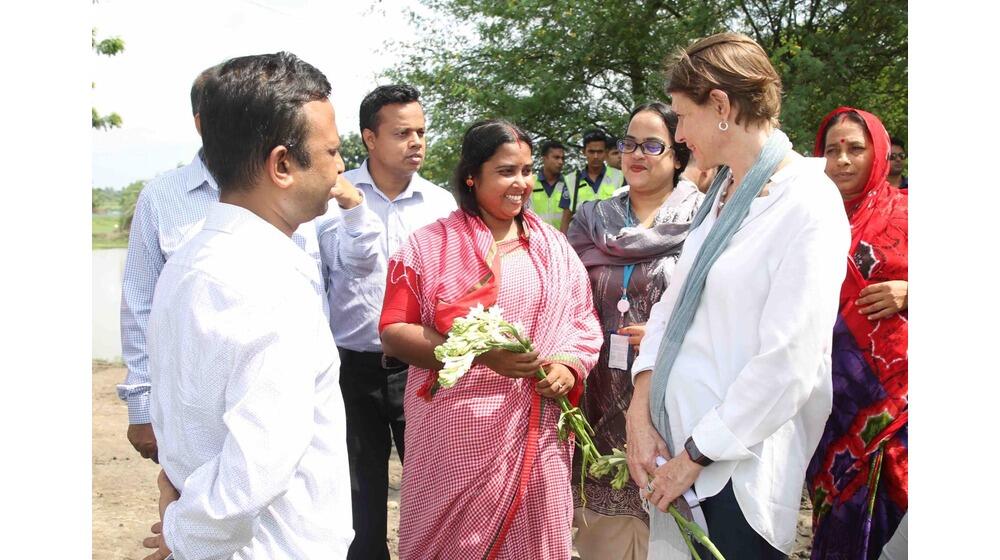A recent visit of the UN country team to Khulna and Barisal divisions in south-central Bangladesh has explored the challenges women face in the areas and highlighted the necessity to advance efforts in addressing gender inequality and women's empowerment. Although Bangladesh has made valuable achievements in ensuring progress on gender equality, information gathered during the visit indicated that women living in Khulna and Barisal divisions are facing many social and economic barriers significantly aggravated by the wide-reaching impacts of climate change.
Five UN agencies - UN Women, an entity for gender equality and the empowerment of women, the UN Population Fund (UNFPA), the Food and Agriculture Organization (FAO), the UN Children's Fund (UNICEF), and the International Labour Organisation (ILO), together with representatives of their development partners - Swiss and German Embassies in Dhaka and the EU Delegation to Bangladesh - took part in the three-day joint mission organised by the UN Resident Coordinator's Office.
Reflecting on the outcomes of the visit, the UN Resident Coordinator in Bangladesh, Gwyn Lewis, said, “Despite progress made across the country, we heard from women and girls in Khulna and Barisal that the social, economic, and now increasing environmental barriers continue to be significant obstacles in the way of women's empowerment and eliminating gender-based violence. More efforts are needed to achieve the vision of the country and women need to be equal partners in that change.”
The delegation visited different UN projects aimed at tackling gender inequalities, promoting women’s empowerment and responding to gender-based violence in these climate vulnerable areas. It met women from diverse communities and backgrounds who spoke about the challenges women and girls, including children, are facing.
“Each day of the mission we continued to hear stories of courage, resilience, and determination shared by women and girls. While progress has been made on women’s empowerment, gender norms continue to hold back women and girls’ potential. Working with men and boys as partners of change to create an enabling environment for gender equality is critical,” the UN Women Country Representative, Gitanjali Singh, said during the visit.
The work of the UN agencies and its partners to improve gender equality in the Khulna and Barisal divisions covers various aspects of women’s everyday life and tackle different social and economic issues.
UN Women, for example, advocates at the national level to influence policies and laws to promote women’s rights and prevent gender-based violence against women and girls and uses a variety of tools and data to implement plans and policies for gender-responsive, human rights-based climate action.
The ILO Country Office, in cooperation with the European Union and the Government of Bangladesh, is implementing projects that aim to increase productivity and better employment opportunities for youth. “ILO has been supporting skills development through the Technical and Vocational Education and Training (TVET) institutes and working with employers’ and workers’ organisations to ensure workplaces are free from violence and harassment so that women can maximize their potential and effectively contribute to the economy,” said the ILO Country Director for Bangladesh, Tuomo Poutiainen.
For its part, FAO addresses the issues of climate change and gender in relation to the national fisheries and aquaculture policy. “Women’s voices were often unheard in decision making,” said Assistant FAO Representative (Programme), Nur Ahmed Khondaker, adding that today more women are taking the lead in community-based organisations, assuming ownership of aquaculture projects, and actively participating in the fish wholesale market system. “Empowering women helps them make a significant change in their family economy and become more resilient against the climate vulnerabilities,” the Assistant FAO Representative said.
The efforts to respond to GBV are also central to the UN Children's Fund (UNICEF) mission to protect the health and well-being of children and women. “Strengthening a child protection system is crucial to prevent harmful practices like child marriage in the country. Understanding the underlying causes of violence and the social norms remains a priority to address violence. A critical strategy is to ensure children, including adolescents and their communities are empowered and become agents of social change,” said the UNICEF Bangladesh Representative, Sheldon Yett.
UNFPA supports gender-based violence multi-sectoral response services that have been considered non-essential in Bangladesh. It implements different programs to engage with married adolescent girls and schoolchildren from hard-to-reach areas and diverse communities to raise awareness about health, education, and well-being.
“Amidst all the notable achievements for gender equality and women’s empowerment, in regions like Barishal and Khulna, countless women and girls continue to endure the harmful effects of child marriage and emotional, physical, and sexual violence. We must prioritize the prevention and response to gender-based violence, empowering women and adolescents with skills, education, and counseling services” UNFPA Country Representative Kristine Blokhus commented on the visit.
The visit was part of the implementation of the UN Sustainable Development Cooperation Framework (UNSDCF) 2022-2026 in Bangladesh which aims to accelerate progress towards sustainable development goals, which includes a specific strategic priority to advance gender equality and eliminate gender-based violence (GBV).


